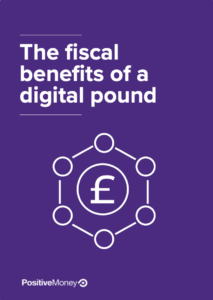The fiscal benefits of a digital pound
Published April 2024

A digital pound, also known as a UK central bank digital currency (CBDC), is expected to be introduced by the Bank of England and Treasury in the second half of this decade. Through the ‘seigniorage’ benefits of lower borrowing costs, it can be estimated that, by 2029, a digital pound would increase government fiscal space by between around £15bn a year in lower adoption scenarios and upwards of £30bn a year in higher adoption scenarios. This would be enough to cover most, if not all, of the £28bn a year green prosperity plan previously proposed by the Labour Party.
This briefing therefore recommends that the government adopts a digital pound for its own spending, thus encouraging a higher adoption scenario and maximising the fiscal benefits. We explore how seigniorage revenue could be used to invest in a fair green transition and long-term economic development through a decentralised national development bank, which can channel investment into infrastructure projects and local authorities, as well as on-lending to stakeholder banks.
PDF DOWNLOADS:
Download full report here
(Free, PDF, 13 pages)
The Treasury and the Bank of England (BoE) judge that a digital pound is likely to be needed by the end of the decade, in order to safeguard the stability of the monetary system and enable innovation in payments.1 A digital pound would be a UK central bank digital currency (CBDC) – a new form of publicly-issued money, like physical cash, accessible to ordinary households and businesses in digital form. Crucially, a digital pound should not be implemented as a replacement for physical cash, but instead as a digital counterpart to the UK’s cash system, securing the public benefits of cash within an increasingly digital economy.
While much of the policy debate surrounding the digital pound has so far focused on technical design considerations, particularly in regards to privacy and financial stability,2 much less attention has been paid to the opportunity it presents to enable greater public investment via increased seigniorage revenue.
Recommendations:
The government and Office for Budget Responsibility (OBR) forecasts the potential impact of a digital pound on the government’s fiscal position.
The government should seek to maximise the full fiscal benefit of a digital pound by using it for its own disbursements and cash management.
The government should develop a framework for reinvesting seigniorage profits from a digital pound into the real economy, such as through a national development bank which could channel funds into a just green transition.